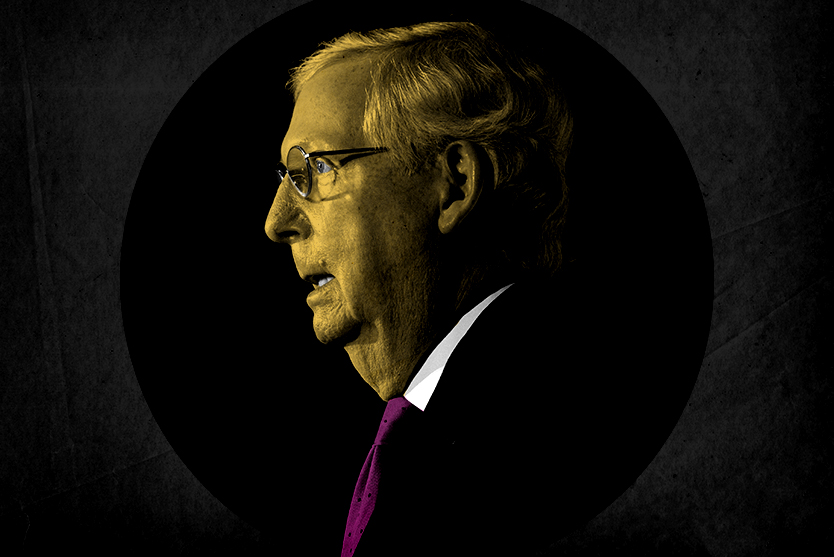Republican Senate wins prove money isn't everything


A free daily email with the biggest news stories of the day – and the best features from TheWeek.com
You are now subscribed
Your newsletter sign-up was successful
One early lesson for Democrats from Election Night results in Senate races: Money isn't everything.
In Kentucky, Amy McGrath vastly outraised incumbent Republican Sen. Mitch McConnell. Jamie Harrison did the same thing to Sen. Lindsey Graham in South Carolina. As did Barbara Bollier in Kansas, who raked in far more cash than GOP nominee Roger Marshall.
It didn't matter. McConnell and Graham retained their seats, and Marshall won his first campaign for the Senate. Those seats have traditionally been held by Republicans, and now will remain in GOP hands for six more years at least.
The Week
Escape your echo chamber. Get the facts behind the news, plus analysis from multiple perspectives.

Sign up for The Week's Free Newsletters
From our morning news briefing to a weekly Good News Newsletter, get the best of The Week delivered directly to your inbox.
From our morning news briefing to a weekly Good News Newsletter, get the best of The Week delivered directly to your inbox.
This suggests that — despite the notion that state and local races have increasingly become nationalized — it remains somewhat true that all politics is local. A lot of the money raised by the Democratic candidates came from out-of-state donors: ActBlue, a national platform for Democratic fundraising, took in a stunning $1.5 billion in contributions over the summer. Outsiders wanted Democrats to win those states' Senate seats more than their residents did.
That's not to say that money doesn't make a difference. Cash probably helped McGrath, Harrison, and Bollier make their races more competitive than they otherwise would have been — it helped them buy a seat at the table, at the very least. But Kentucky, South Carolina, and Kansas tend to be conservative states with lots of conservative voters.
It was going to take more than money to change that fact; a cultural shift would have been required. Such shifts usually take more than one campaign cycle.
A free daily email with the biggest news stories of the day – and the best features from TheWeek.com
Joel Mathis is a writer with 30 years of newspaper and online journalism experience. His work also regularly appears in National Geographic and The Kansas City Star. His awards include best online commentary at the Online News Association and (twice) at the City and Regional Magazine Association.
-
 Switzerland could vote to cap its population
Switzerland could vote to cap its populationUnder the Radar Swiss People’s Party proposes referendum on radical anti-immigration measure to limit residents to 10 million
-
 Political cartoons for February 15
Political cartoons for February 15Cartoons Sunday's political cartoons include political ventriloquism, Europe in the middle, and more
-
 The broken water companies failing England and Wales
The broken water companies failing England and WalesExplainer With rising bills, deteriorating river health and a lack of investment, regulators face an uphill battle to stabilise the industry
-
 Epstein files topple law CEO, roil UK government
Epstein files topple law CEO, roil UK governmentSpeed Read Peter Mandelson, Britain’s former ambassador to the US, is caught up in the scandal
-
 Iran and US prepare to meet after skirmishes
Iran and US prepare to meet after skirmishesSpeed Read The incident comes amid heightened tensions in the Middle East
-
 Israel retrieves final hostage’s body from Gaza
Israel retrieves final hostage’s body from GazaSpeed Read The 24-year-old police officer was killed during the initial Hamas attack
-
 China’s Xi targets top general in growing purge
China’s Xi targets top general in growing purgeSpeed Read Zhang Youxia is being investigated over ‘grave violations’ of the law
-
 Panama and Canada are negotiating over a crucial copper mine
Panama and Canada are negotiating over a crucial copper mineIn the Spotlight Panama is set to make a final decision on the mine this summer
-
 Why Greenland’s natural resources are nearly impossible to mine
Why Greenland’s natural resources are nearly impossible to mineThe Explainer The country’s natural landscape makes the task extremely difficult
-
 Iran cuts internet as protests escalate
Iran cuts internet as protests escalateSpeed Reada Government buildings across the country have been set on fire
-
 US nabs ‘shadow’ tanker claimed by Russia
US nabs ‘shadow’ tanker claimed by RussiaSpeed Read The ship was one of two vessels seized by the US military
